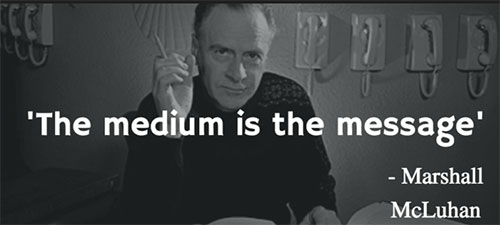The Medium is the Message

Remember those words? The phrase was introduced in Marshall McLuhan’s book Understanding Media: The Extensions of Man, published in the dim and distant days of 1964. I was a young teen at the time, basking in the bourgeoisie pleasures of suburban Detroit. We had some problems at the time- perhaps you have heard of them? But on the whole, life was pretty good. We got up to change the channels on the television, sought out pay-phones to make emergency calls or have affairs- which I was sadly not doing at the time- and otherwise were tied to our landlines in our homes.
Telephone answering machines were cutting edge technology. The first ARPANet message was still five years away.
It was the way things had been, essentially since the days Alexander Graham Bell. When I think of the transformative nature of technology, and what we have seen since 1970, I have to guess that I will be able to hire a robot to generate content from AI for the site so I can retire, and even have The Daily go on into the distant future in a sort of digital perpetual motion.
McLuhan was on to something way back then, though he couldn’t know the immensity of the phenomenon he was attempting to describe. In his view, a ‘medium,’ not solely by the content it carries, and that was what needed to be studied. He included every means of communication, from phones to TV, radio and all the means by which advertising is inflicted on us. He said that a medium affects society not just by what content was transmitted, but also by the characteristics of the medium itself
For McLuhan, it was the medium itself that shaped and controlled “the scale and form of human association and action.” The concept even included the wildly non-traditional definition of what communication really was. For example, he identified the light bulb as a clear demonstration of his concept. A light bulb has a social effect, he argued, reasoning that light enables people to create spaces during nighttime that would otherwise be enveloped by darkness, which actually describes our current watering hole at the Front Page pretty well. Some mediums have no recognizable content, and yet have profound social effects.
McLuhan describes the “content” of a medium as a juicy piece of meat carried by the burglar to distract the watchdog of the mind. OK, OK, I am not going to continue down that road. Go back and look at the book, and consider the electronic swirling circus of messaging we have to process from every direction. Consider it in the context of the long national nightmare we have endured since the last campaign began. It boggles the mind.
Some of you might have been expecting more from Marlow this morning, since his musings on motorcycles and the Motherland have been highly entertaining over the past few weeks. (We plan on packaging the series as something that might be called “Marlow’s Four Corners: A Ride on the Edge of America.” Stay tuned.
Others may have expected another plunge into the comfortable dimness of the Willow Bar to explore the remarkable career of Admiral Mac Showers. I think we are beginning to see the completion of that project- “Cocktails with the Admiral: Hot and Cold Wars in the American Century.” So, rest assured, there is a bit more of Mac’s life to be inflicted on you.
And in fact, that is where all these strands begin to come together. There are a couple mysteries that remain in Mac’s career, and they are tantalizing ones. Marlow knows some fundamental truths about human on two wheels and filled with adventure and wanderlust. McLuhan was right about content and about mediums, though I have discovered he wasn’t covering enough ground.
What I propose to do over the next couple days is tell you a story about a medium that just crossed my path.
Her name is Karen Anderson, and this is what manifestation the former Colorado Deputy Sheriff presents to the world these days:

Karen is a very nice and personable lady. She also talks to spirits. I will have a bit more about that sort of medium for you tomorrow.
Copyright 2017 Vic Socotra
www.vicsocotra.com
